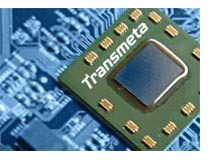Transmeta to provide LongRun2 for Sony's Cell processor
Sunnyvale (IL) - Following its fourth quarter results announcement on Tuesday, Transmeta today appointed a new president and CEO, laid off a quarter of its workforce and placed an all-or-nothing bet on Sony by integrating LongRun2 into "derivatives" of the Cell processor.
Transmeta detailed its plans that aim to transition the firm a processor manufacturer to an intellectual property (IP) and service company. Given the dramatic financial situation of the firm, the changes were expected to be equally dramatic - and Transmeta delivered what analysts wanted to hear.
"We are not opening just a new chapter for Transmeta. We are opening a new book," commented Art Swift, who replaces Matthew Perry as the firm's president and CEO. Besides the promotion of Swift from senior vice president of marketing to Transmeta's top post, the company had several other significant announcements.
Transmeta presently has three licensees for its LongRun2 technology - NEC, Fujitsu and Sony. The latter two already have paid their fees to Transmeta. Swift also announced that Sony will fund more than 100 Transmeta engineers or about 50 percent of the firm's workforce. According to Swift, Sony will integrate LongRun2 into "derivatives" of the upcoming Cell processor that will make its debut in the PlayStation 3.
Transmeta declined to answer questions from journalists during a conference call. However, there is no doubt that the infusion from Sony, who has no financial stake in Transmeta, provides great relief for Transmeta dwindling cash reserves. Industry sources cautioned about the long-term effect on this alliance: Transmeta has a history of placing large bets on technologies that have not established - such as on the Tablet PC back in 2002. The Cell processor has been widely praised so far, but should it fail to be a success beyond the Playstation, it is uncertain if Transmeta's all-or-nothing bet on Sony will have a future.
The company enters the first fiscal quarter with roughly $38 million in cash reserves and expects to burn through about $16 million in the first three months. Beyond that, the quarterly loss will be reduced to $5 million or less, according to Mark Kent, chief financial officer of the company. In the long term, the company hopes to generate revenues from IP licensing and engineering services. Licensing fees however do not kick in until real products are in mass production. As a result, Transmeta is unlikely to collect substantial royalties is unlikely to happen in this year and Transmeta will have to believe in the success of the Cell processor and focus on reducing its cost during the next 12 months.
According to Swift, the processor business of Transmeta is ramping down quickly. "Customers have received an end-of-life notification from us for the Crusoe products and the 130nm Efficeon processor," he said. The company plans to keep up some chips of its 90nm Efficeon family, but will sell the processors for higher prices and request from customers prepayments for wafer starts. "We know that this will have the effect that some customer will not buy from us anymore. But critical customers agreed to the higher prices," Swift said.
Get Tom's Hardware's best news and in-depth reviews, straight to your inbox.
Today's announcement marks Transmeta most dramatic and important transition so in its short company history. Once a company that set sail to revolutionize the mobile world but in the end was outpowered by Intel's marketing and product fireworks, Transmeta no has probably its last chance to build a profitable business. The new business model looks promising, but will have to show positive results quickly in order to save the firm from closing its doors.

Wolfgang Gruener is an experienced professional in digital strategy and content, specializing in web strategy, content architecture, user experience, and applying AI in content operations within the insurtech industry. His previous roles include Director, Digital Strategy and Content Experience at American Eagle, Managing Editor at TG Daily, and contributing to publications like Tom's Guide and Tom's Hardware.
